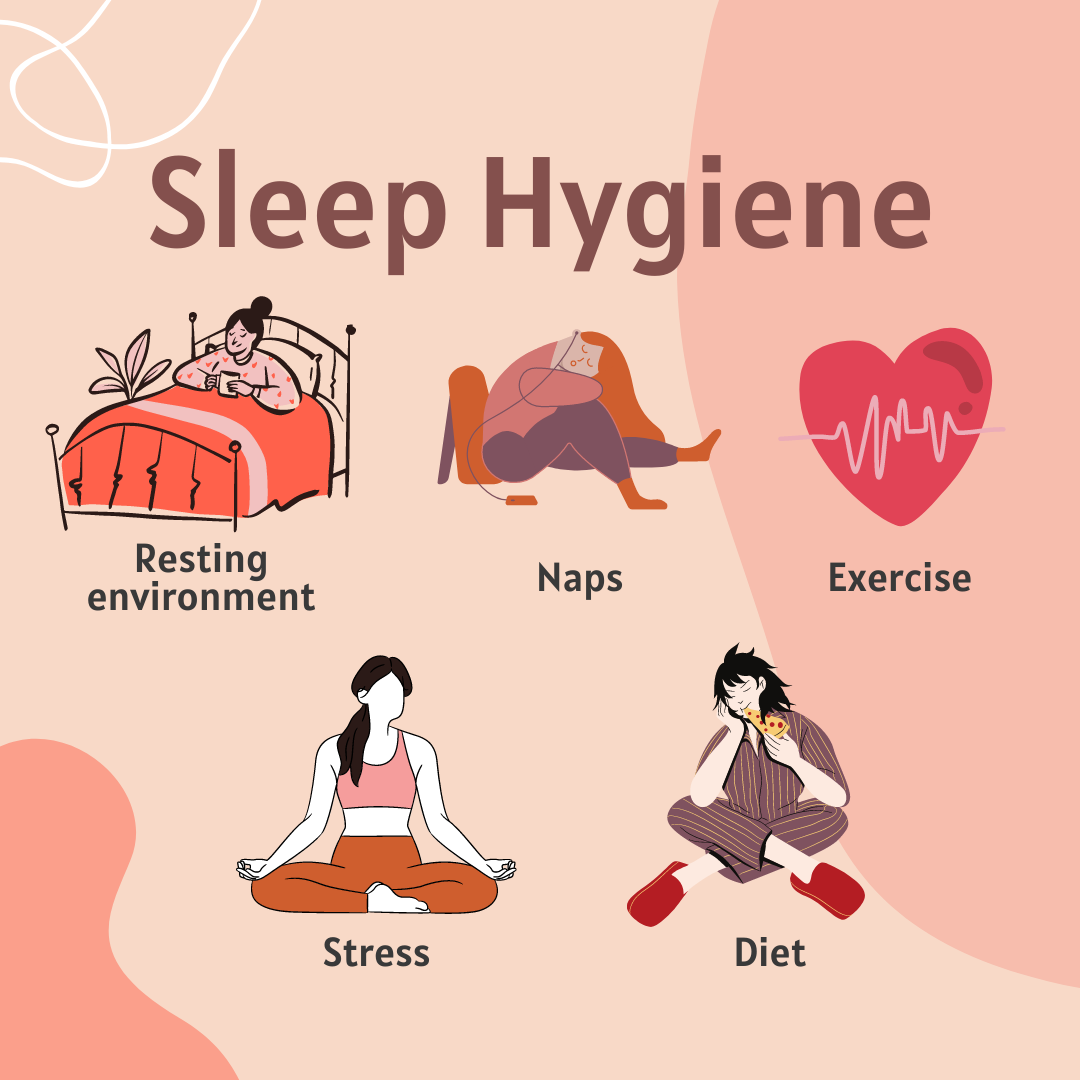
Getting enough good sleep is a persistent issue that many students face. While the pre-pandemic era meant our in-person obligations somewhat forced us to stick to a routine, during the pandemic our schedules are somewhat more flexible. This flexibility doesn’t always lead to better sleep, especially if our routines have been disturbed. During the summer there were days where I woke up at noon or slept at odd hours in the afternoon. Sometimes I would sleep for an average of six hours, and other times I would sleep in short bursts of two or three hours. Whether you experience undersleeping, oversleeping, or disrupted sleep, being mindful of your own sleep routine can help you incorporate strategies for a better night’s sleep.
Undersleeping
This is the subject of many conversations around sleep. In fact, many adults do not sleep the recommended 7–9 hours of sleep a night. Personally, this has been a persistent problem for my own health, as sleeping for less than 8 hours can create noticeable behavioral changes the next day. I find myself crankier, less focused, and even unmotivated to perform daily tasks. A band-aid solution to a lack of sleep may include a large cup of black coffee, but a vicious cycle starts when I then have trouble falling asleep the same day. It has been demonstrated that substances including alcohol, caffeine, and some medications can affect your ability to sleep.
Strategy: One solution that I’ve found useful is meditating an hour before bed to truly unwind my mind. Try making a relaxing activity part of your wind-down strategy.
Oversleeping
If you’re sleeping more than the recommended 7–9 hours a night but still feeling unrested, it may be a sign of underlying health issues. Ironically, oversleeping may actually leave your body feeling even more fatigued and lethargic. According to a Harvard Medical School blog post, the quality of sleep is much more important than the total number of hours spent in bed. Specifically, individuals should tailor their sleep to their own needs. For example, as someone who needs the full recommended 8 hours of sleep a night to feel rested, disruptions like waking in the night or eating heavy meals before bed can impede my restful sleep cycle.
Strategy: One solution I’ve found useful is to maintain the same schedule on weekends and holidays as I do on the weekdays. After figuring out the number of hours of sleep that works best for you, make sure to set your alarm every day to avoid oversleeping.
Sleep Hygiene
Sleep hygiene should be as important to our routines as hand hygiene is. Sleep hygiene is a term that many health care professionals use to describe habits that affect the quality of our sleep. For example, these can include a number of different activities including eating heavy meals before bed, excess screen time, and even daytime habits such as completing homework in bed. Let’s take a closer look at some of these activities and optimize them for a better snooze with reduced feelings of dread when waking up the next day:

Resting Environment:
Ensure your bedroom is optimized for sleep. If other activities besides sleep and relaxation are carried out in your sleeping environment, it can interfere with your ability to fall asleep. Even though writing your essay in bed may seem like a great idea, it can interfere with your sleep later on. I am definitely guilty of texting and watching Netflix in bed, but since confining these activities to my desk or living room it has improved my sleep significantly. Usually a darker, quieter, and cooler environment is preferred. If needed, fans, humidifiers, and earplugs may be used to enhance your experience.
Naps:
Despite feeling intensely exhausted after my pharmacy rotations, I limit my naps to only 30 minutes during the day as it can interfere with my sleep later on. To ensure you have a consistent number of hours of sleep, taking only short naps is ideal or it can make it more difficult to fall asleep.
Exercise:
Exercise can help reduce insomnia and sleep disturbance. Aerobic or cardiac exercises such as brisk walking, running, cycling and swimming have been linked to improved mental health and sleep. Exercise changes your physiological body temperature and can improve digestion as well. If you feel bloated before bed as I often do, doing mild exercise can help improve how you feel and have a positive affect on your sleep cycle.
Stress:
One of the biggest culprits for me is stress-induced insomnia. After a mentally stimulating review session, my mind races and I start planning for the next day. When our bodies are in a fight or flight state, we might forget to rest and digest and our sleep is affected as a result. Some simple ways to help reduce anxiety and stress is to practice meditation or yoga before bed. When I follow a yoga routine on YouTube, it helps me calm the nerves after a busy day. Journaling is another good technique for unloading your mind.
Diet:
On days when I slept in late, I also ate late as well. I had heavy take-out meals that caused a lot of heartburn that impacted my sleep. I would wake up in the middle of the night with feelings of discomfort. Avoiding heavier meals a couple of hours before bed is a good rule of thumb. Reducing or eliminating alcohol, caffeine, and nicotine from your diet can also lead to a better sleep. While alcohol can make us drowsy, it can also disrupt deeper sleep. Caffeine is a stimulant that should be used earlier during the day.